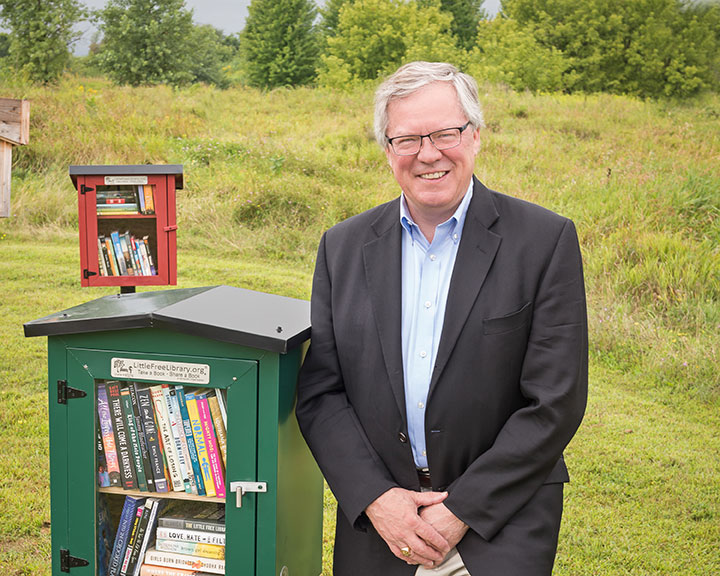M. Greig Metzger II ’82 Boosts Reading Through Neighborhood Book-Sharing
After helping alleviate hunger for almost five years, Metzger is working to address another issue – literacy and access to books — through the nonprofit Little Free Library. Based in Hudson, Wis., the organization fosters book exchanges, where people install little boxes of books on their lawns or in public spaces so their neighbors can grab a book and share their own.
Before becoming executive director of Little Free Library in July, Metzger had helped transform the food shelf from a “little sleepy, closet in the basement of a church — not quite that small but almost” — to an organization that quadrupled the number of people it served and made it into a grocery-store experience.
Key to their success, he says, was engaging volunteers and partners such as grocery stores to help their neighbors who didn’t have enough to eat. He sees the same concept— “getting people engaged at a community level to solve a problem” — at work at Little Free Library, albeit on a larger scale with more than 90,000 libraries located in every state and 91 countries.
The people who start little free libraries — they’re called “stewards” — can make their own boxes or buy kits or pre-built libraries from the nonprofit. The organization aims to build community connections as neighbors run into each other perusing titles, and encourage reading through the free book-sharing boxes that are open 24/7.
Stewards “are a little bit like community organizers,” he says. “One of the things that I’ve been brought in to help do is figure out how best to build and reinforce and strengthen what is effectively a volunteer group of thousands spread across the country.”
“Access to books is a significant challenge for many communities in America,” says Metzger. And Little Free Library “has evolved over time … to be really focused on providing access to books and literacy.” The organization addresses that challenge by working with partners, whether local companies or other organizations, to bring book boxes particularly to low-income communities, where people might not have many books in their homes or the resources to install boxes. Another way the organization promotes book access is through its Impact Library Program, which provides little libraries (boxes and books) to areas in need.
An economics major at Princeton, Metzger started his career at global financial services companies before working at a number of start-ups. He shifted into the nonprofit world in 2014 when he joined the food shelf, where he learned “how to do everything from driving a truck to standing in front of an audience of 500 people” and asking them to write checks. And he met people who were hungry, like a mother of two who came to the food shelf without telling her husband because he was embarrassed. One day, she tearfully thanked Metzger. “It was incredibly rewarding to try to help people navigate through just a little part of their lives,” he says.
Attracted by the opportunity to improve people’s lives, Metzger has decided that “the nonprofit world is the place I want to be.”












No responses yet